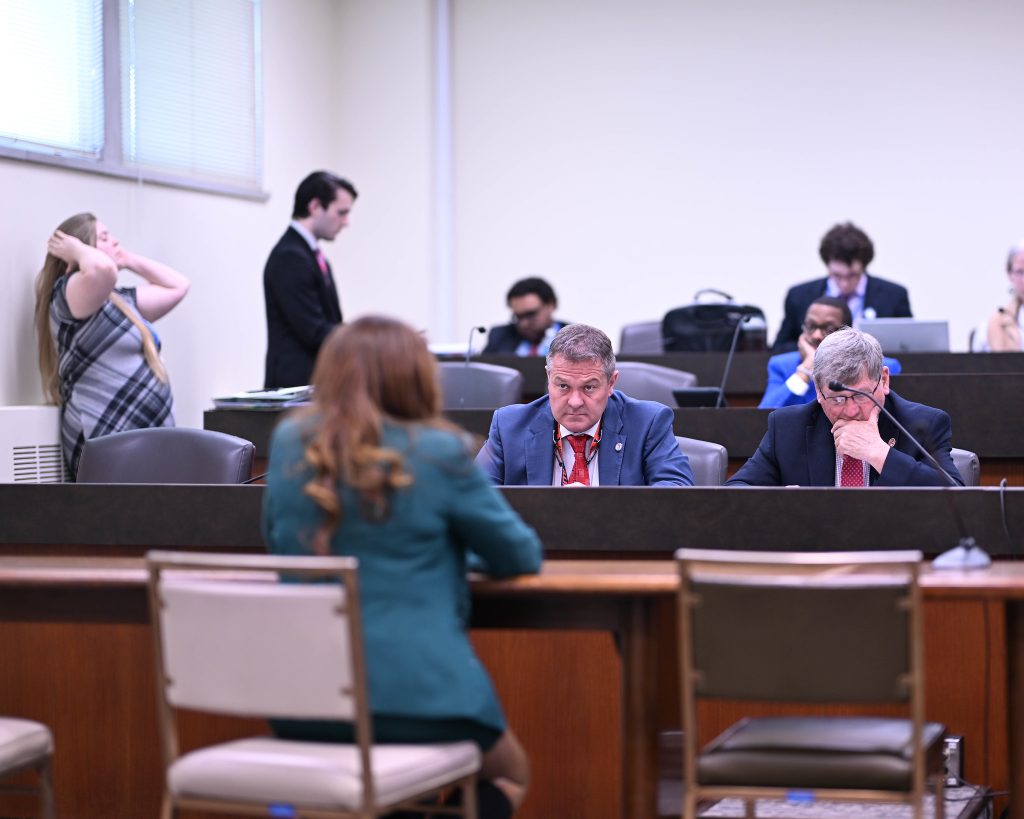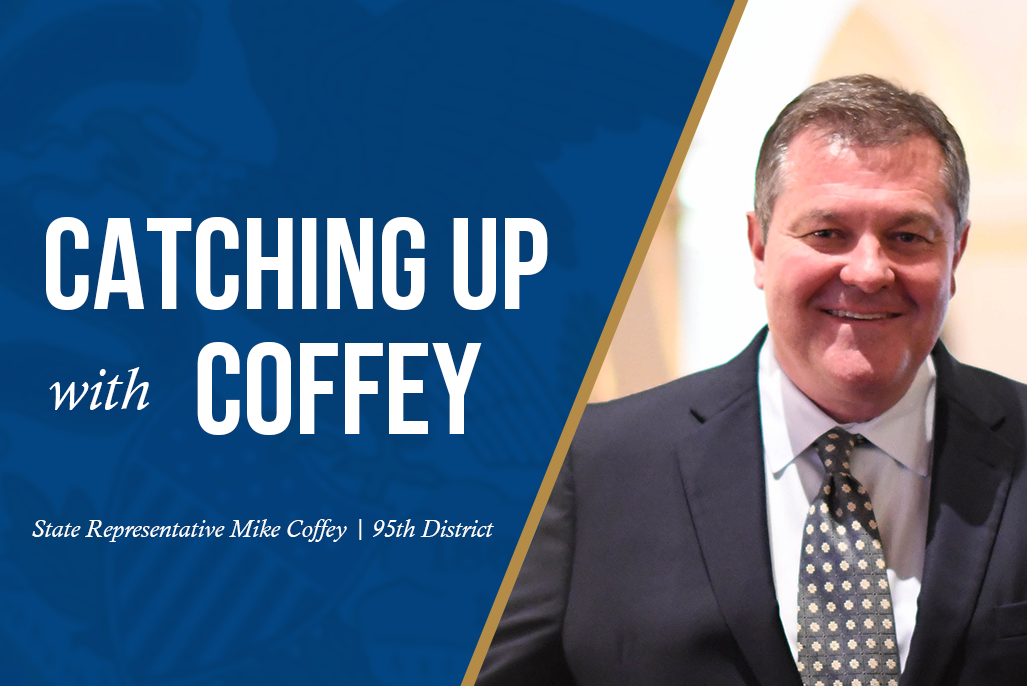BUDGET
Illinois House Republicans Slam $6 Billion in Proposed Tax Hikes. Legislators Condemn Pritzker’s Dangerous Political Rhetoric on the National Stage. Illinois House Republicans slammed proposals from progressive interest groups that would raise taxes by $6 billion on Illinois working families and businesses.
State Representative Mike Coffey said Illinois Democrats have a bad spending habit:
“Our state can’t afford to keep spending recklessly on unnecessary programs and services for non-citizens,” said Rep. Coffey. “Covid funds are drained and Illinois is facing a massive budget deficit, so I strongly urge my colleagues on the other side of the aisle to evaluate their spending habits.”
At a Capitol news conference Thursday, Deputy Republican Leader Norine Hammond and Assistant Republican Leaders C.D. Davidsmeyer and Amy Elik called the $6 billion in proposed tax hikes “outrageous and unacceptable.”
Last week, progressive Democrats ramped up their campaign for a graduated income tax hike, despite Illinois voters soundly rejecting a constitutional amendment for a progressive income tax in 2020. And the Illinois Revenue Alliance presented a list of tax hikes that would raise taxes by $6 billion.
“These progressive special interests that are part of the Illinois Revenue Alliance, aka the ‘Tax-and-Spend Alliance,’ are proposing $6 billion in new taxes on hardworking Illinois families and businesses,” said Rep. Hammond. “$6 billion in new taxes! All to pay for taxpayer-funded healthcare benefits for illegal immigrants, more pork projects for Democrats, and a wish list of wasteful spending programs. These tax hikes would further damage our economy and drive up the cost of living for Illinois families.”
Hammond, who serves as the Chief Budgeteer for the House Republican Caucus, called out what she considers to be the most egregious tax hike proposal: raising the Estate Tax by cutting the exemption in half (from $4 million to $2 million).
“Our family farmers are struggling enough already,” Rep. Hammond said. “They shouldn’t have to sell the family farm just to pay this unfair tax. We should be encouraging and supporting our family farmers, not taxing them to death.”
Deputy Budgeteer Amy Elik questioned why state agencies haven’t presented their lists of proposed cuts to the budget, rather than relying on more taxes to fund state government.
“So far this spring, we haven’t talked about the most important issues affecting Illinois families, like high property taxes and the high cost of living and doing business in Illinois,” said Rep. Elik.
“The people of Illinois are tapped out. We cannot accept ANY tax increases. Our seniors are suffering under the weight of crushing property tax bills; it’s hard for young families to afford housing, daycare, and utilities; and this budget – and any other bill that comes out of this General Assembly – cannot include a tax increase. That’s a message that resonates with people all across Illinois.”
While progressive Democrats are demanding tax hikes for more wasteful government spending, Governor JB Pritzker is spending his time stumping around the country for his 2028 presidential aspirations. Even worse, Pritzker is resorting to inflammatory, dangerous rhetoric in his attacks on President Trump and Republicans.
Referring to President Trump at a speech in March, Pritzker said, “Bullies respond to one thing, and one thing only, a punch in the face.” During that same speech at a California LGBTQ convention, Pritzker said, “I won’t continue to advocate that we wage conventional political fights when what we really need is to become street fighters.”
Gov. Pritzker’s calls for political unrest and his wink and nod toward political violence didn’t end there. Earlier this week at a New Hampshire Democratic Party fundraiser, Pritzker ramped up the rhetoric.
First, he started his speech by saying, “It’s time to fight everywhere and all at once.”
Then, Pritzker crossed the line in calling for political violence.
“Never before in my life have I called for mass protests, for mobilization, for disruption, but I am now. These Republicans cannot know a moment of peace.”
State Rep. C.D. Davidsmeyer condemned Pritzker’s dangerous political rhetoric on the national stage.
“Governor Pritzker, your comments are appalling. You should apologize to all Republicans for encouraging harassment and disruption as you focus on your White House aspirations. The hateful rhetoric, threats of violence, and the actual attacks that are sure to follow are on you and you alone,” Davidsmeyer said.
“The Governor should be spending his time working with us on a balanced budget, rather than threatening to punch Republicans in the face. Governor Pritzker, do the job you were elected to do, not the job you so desperately want in Washington, D.C.”
McCombie Responds to Pritzker’s Dangerous, Power-Hungry Rhetoric
Illinois House Minority Leader Tony McCombie released the following statement in response to Governor JB Pritzker’s recent remarks:
“Governor Pritzker’s rhetoric has crossed a dangerous line. In July, he rightly declared, ‘Violence is never the answer in our democracy.’ Yet now, he calls for mass disruption, declares that Republicans ‘cannot know a moment of peace,’ and urges Americans to ‘become street fighters.’ These are not the words of a unifier—they are the words of someone willing to trade principle for power.
“In a time when political violence has already taken a terrible toll on this country, such inflammatory language is reckless, irresponsible and just dangerous. Disagreement in a democracy must never justify dehumanization or threats of unrest. Leaders set the tone. If we normalize this kind of dangerous escalation, we risk eroding the very democratic foundations we claim to protect.”
ENERGY
Electric bills set to soar again this summer. Midcontinent Independent System Operator (MISO), the interstate grid operator that posts prices for peak-load electrical supplies bought by utilities and end-users throughout central and southern Illinois, has reported a massive increase in summer capacity prices.
These are the price levels charged by peak-load electrical generation suppliers that operate and supply electricity online during times of peak summer demand. In some cases, these peak-load electrical supply prices, which electric utilities are legally empowered to pass on to their customers, are 22 times higher than last summer’s prices. These price levels reflect the continued withdrawal of coal-fired and other carbon-based electric generation from the supply picture of the central U.S. states, coupled with improved use of mathematical algorithms by the remaining suppliers to maximize their prices and profits.

“If we don’t have grid stability, there is no question that our state will suffer greatly from progressive policies that are aimed to reach 100 percent renewable energy. Legislators must take action to ensure energy demands are met by utilizing all the resources available because relying strictly on wind and solar is not working and it’s driving energy costs up.”
The largest utility serving central and southern Illinois, Ameren, warned customers this week that the utility expects to pay approximately 50% more this summer for the electricity it purchases. Ameren expects the overall prices will increase from 8 cents per kilowatt hour (kWh) last summer to 12 cents/kWh this summer. After these supply prices are passed on to customers as allowed by law, the average summer 2025 consumer electric bill will be 18% to 22% higher in summer 2025 than during the comparable months of 2024. This price increase will apply to the four-month period beginning June 1, 2025, and ending on September 30, 2025.
Starting on October 1, 2025, and in line with expected end of summer temperatures and air-conditioning-related peak demand loads, the summer 2025 capacity price structure posted by MISO will expire, and the billing surcharges to be charged by Ameren and other Downstate Illinois electrical utility suppliers may be partly reduced. The Downstate Illinois summer 2025 electrical pricing picture was described to members of the General Assembly on Wednesday, April 30.
HEALTH CARE
Many Illinois hospitals making major efforts to deliver seamless care are rewarded with high national ranking. Leapfrog, the database consortium of institutional health insurance buyers, grades covered hospitals with a grade, based on nationwide outcome metrics, of ‘A’ to ‘F.’ The grading is conducted every six months. In the spring 2025 tabulation, 35 Illinois hospitals earned ‘A’ rankings. This meant that Illinois rose from 30th among the 50 states to 20th in terms of overall hospital seamless care and safety.
While a significant number of Illinois hospitals have improved since fall 2024, three Illinois hospitals have been continuously graded ‘A’ during the 13-year history of the Leapfrog grading tabulation. The three Illinois hospitals honored in this fashion, which puts them in a list of only 11 hospitals nationwide, are Endeavor/Elmhurst, Northwestern/Du Page, and the University of Chicago Medical Center.
TAXES
Four Illinois cities rank among the highest property tax rates in the country. A new study reported by Crain’s reveals four out of the top five urban areas with the highest property tax are in Illinois.
The report comes after a property information service, Attom, analyzed the property tax rates for 217 different urban areas.
The four cities listed were Rockford, Chicago, Peoria and Champaign-Urbana. The report detailed the percentage homeowners pay above market value for their home.
Here are the results:
- Rockford: 2.06% above market value
- Chicago: 1.91% above market value
- Peoria: 1.89% above market value
- Champaign-Urbana: 1.88% above market value
Attom’s analysis also said the effective property tax rate by homeowners in those cities was more than double the national average.
